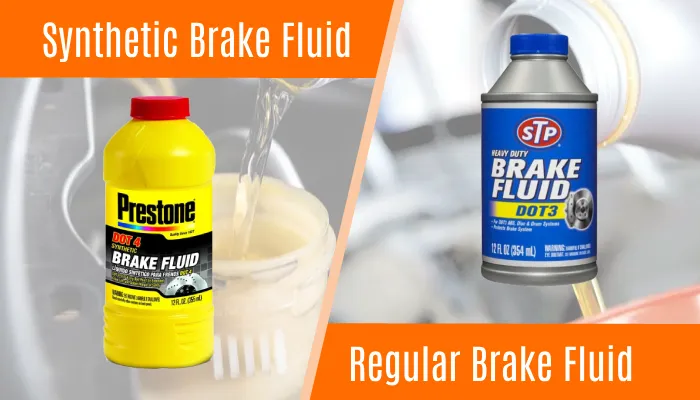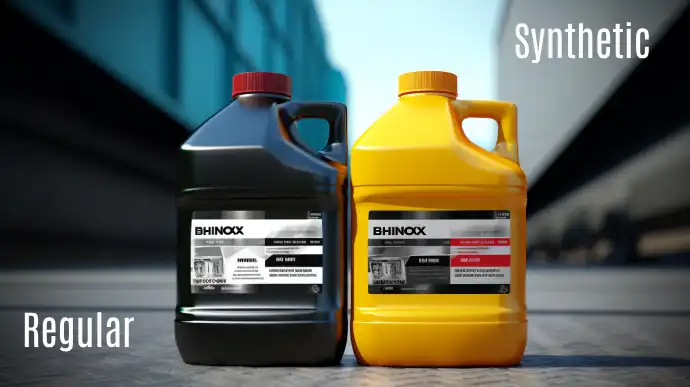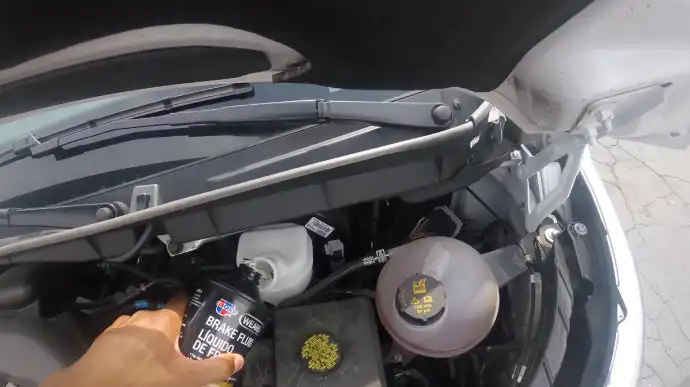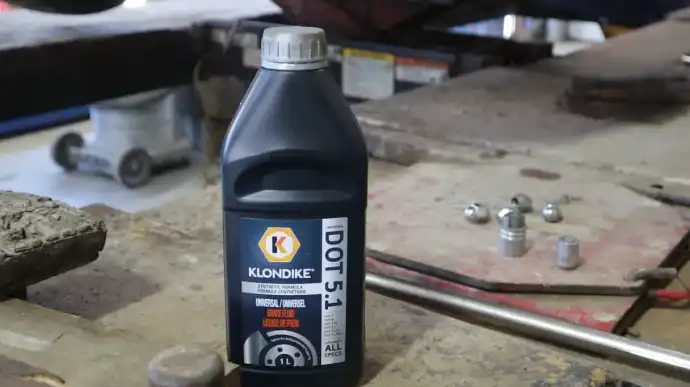Physical Address
304 North Cardinal St.
Dorchester Center, MA 02124

Brake fluid transmits force from the brake pedal to the brake calipers, enabling efficient braking. It is a critical component of any vehicle’s braking system. And when choosing the right brake fluid for your vehicle, the decision often boils down to two primary categories: synthetic brake fluid and regular brake fluid.
Synthetic brake fluid is made from glycol-ether-based compounds and does not contain petroleum components. In contrast, regular brake fluid can be glycol-ether-based or mineral-based, often containing petroleum-based ingredients.
Synthetic brake fluid is more engineered and petroleum-free, making it suitable for high-performance or advanced brake systems. Conversely, regular brake fluid is generally suitable for standard brake systems.
Here, we will explore the differences between synthetic and regular brake fluid, including their compatibility, DOT ratings, and more.

With regard to the differences between synthetic brake fluid and regular brake fluid for your vehicle, there are several key points to consider.
Unlike petroleum-based brake fluid, synthetic brake fluid contains no petroleum components. It’s chemically engineered, which gives it advanced properties and performance characteristics.
On the other hand, regular brake fluid can be either glycol-ether-based or mineral-based and often contains petroleum-based ingredients. This fundamental difference in composition sets the two types apart.
Synthetic brake fluid is typically formulated to meet the specific needs of high-performance or advanced brake systems. It has a higher boiling point and better moisture absorption resistance, making it suitable for applications that generate high temperatures or require enhanced performance.
Alternatively, standard brake systems can use regular brake fluid that operates under normal conditions. However, it may not provide the same level of performance and protection as synthetic brake fluid in advanced or specialized systems.
Since synthetic brake fluid doesn’t absorb moisture, it has a significant advantage over regular brake fluid. This is crucial because moisture can negatively impact the boiling point stability of brake fluid, especially under high-temperature conditions.
Meanwhile, regular brake fluid is more prone to moisture absorption, which can decrease its boiling point over time. This decrease in boiling point can compromise the performance of the brake fluid during extreme braking situations.
Choose synthetic brake fluid for improved parts compatibility and lubrication in your vehicle’s braking system. Synthetic brake fluid is specifically formulated to be compatible with the rubber components used in braking systems, such as hoses, seals, and o-rings.
This compatibility ensures that the brake fluid doesn’t cause any damage or degradation to these critical parts, which can lead to leaks and potential brake failure.
Additionally, synthetic brake fluid provides effective lubrication for caliper pistons, allowing for smooth movement and optimal braking performance. This lubrication helps to reduce friction and wear on the moving parts, extending their lifespan and ensuring consistent and reliable braking.
On the other hand, regular brake fluid may not offer the same level of compatibility and lubrication properties. It may potentially lead to increased wear and reduced component lifespan.
Changing synthetic brake fluid at the recommended intervals is crucial for maintaining your vehicle’s braking system’s compatibility, lubrication, and overall performance.
Manufacturers typically recommend changing synthetic brake fluid after 3 years or 45,000 miles. This interval takes into consideration the need to prevent contamination and moisture accumulation, which can lead to brake system failure.
Synthetic brake fluid has a longer recommended lifespan compared to regular brake fluid, which is typically recommended to be changed every 2 years or 30,000 miles.
However, it’s important to note that the recommended change intervals may vary depending on factors such as weather conditions, the type of vehicle, and driving habits.
Synthetic brake fluid performs better in extreme conditions due to its higher boiling point than regular brake fluid. This is particularly important when the brake system is pushed to its limits, such as when braking heavily or repeatedly.
The higher boiling point of synthetic brake fluid, reaching up to 410°F (wet) and 580°F (dry), enhances its ability to maintain consistent braking performance under extreme heat. As a result, synthetic brake fluid provides a safer and more reliable braking experience, even under demanding driving conditions.
Conversely, regular brake fluid has lower boiling points, 284°F (wet) and 401°F (dry). It potentially makes it less suitable for extreme conditions where the brake system is strained.
To protect your vehicle’s brake system from corrosion, synthetic brake fluid offers superior resistance compared to regular brake fluid. Corrosion in the brake system can lead to reduced performance and potentially costly repairs.
Synthetic brake fluid is formulated with additives that enhance corrosion resistance properties, helping to prevent rust and corrosion on brake system components. These additives create a protective barrier that inhibits oxidation, reducing the likelihood of corrosion damage.
In contrast, regular brake fluid may not contain the same level of corrosion inhibitors, making it more susceptible to corrosion. Due to its mineral oil base, regular brake fluid is more prone to water absorption, leading to rust and corrosion.

Synthetic brake fluid offers a more environmentally friendly alternative to regular brake fluid for your vehicle.
The glycol-ether base of synthetic brake fluid allows it to biodegrade more readily than the mineral-based components found in some regular brake fluids. This means that synthetic brake fluid has a lower environmental impact regarding disposal.
Conversely, regular brake fluids may contain mineral-based components that are less environmentally friendly. These components can pose challenges when disposing of used brake fluids, and it’s crucial to follow local regulations for proper disposal.
Due to its advanced formulation and enhanced performance benefits, synthetic brake fluid tends to be relatively more expensive than regular brake fluid. The cost difference can be attributed to the higher quality and increased performance capabilities of synthetic brake fluid.
On the other hand, regular brake fluid, being more common and versatile, is generally more widely available and tends to be more cost-effective. This makes regular brake fluid a practical choice for budget-conscious vehicle owners.
| Aspect | Synthetic Brake Fluid | Regular Brake Fluid |
| Composition and Base Materials | Chemically engineered, no petroleum components | Glycol-ether-based or mineral-based, often petroleum-based |
| Brake System Compatibility | Formulated for high-performance systems, higher boiling point, better moisture resistance | Suitable for standard systems, may lack performance in advanced applications |
| Moisture Absorption | Does not absorb moisture | Prone to moisture absorption, impacting boiling point stability |
| Parts Compatibility and Lubrication | Compatible with rubber components, effective lubrication | May not offer the same level of compatibility and lubrication |
| Recommended Lifespan and Change Intervals | Change every 3 years or 45,000 miles | Change every 2 years or 30,000 miles |
| Performance in Extreme Conditions | Higher boiling point (410°F wet, 580°F dry), consistent performance under extreme heat | Lower boiling point (284°F wet, 401°F dry), potentially less suitable for extreme conditions |
| Corrosion Resistance | Superior resistance to corrosion, formulated with additives for protection | May lack the same level of corrosion inhibitors, more susceptible to corrosion |
| Environmental Impact | More environmentally friendly, glycol-ether base allows for easier biodegradation | May contain less environmentally friendly mineral-based components, disposal challenges |
You can mix regular brake fluid with synthetic brake fluid without any issues. Both brake fluid types are compatible and won’t cause any adverse effects when mixed.
Mixing synthetic brake fluid with regular brake fluid won’t decrease the performance of the synthetic brake fluid. However, it may lower the overall performance of the brake fluid mixture.
Using one type of brake fluid consistently is recommended to maintain optimal performance and avoid any potential compatibility issues.
Using synthetic brake fluid in vintage cars may not be advisable due to potential compatibility issues and differing brake system requirements.
Vintage cars often have unique braking system designs that may not be compatible with synthetic brake fluid. These older models may require a specific type of brake fluid designed to work with their particular brake system components.

Some brake fluids mention DOT 5.1, others don’t, indicating that not all brake fluids meet the specific performance standards set by this rating. DOT 5.1 is a brake fluid specification developed by the Department of Transportation (DOT) to ensure the safety and performance of brake systems.
Brake fluids that meet the DOT 5.1 standard have been rigorously tested to meet certain criteria, such as boiling point, viscosity, and compatibility with other brake system components. These fluids are designed to increase performance and reliability, especially in high-stress situations.
Neglecting regular brake fluid changes can lead to detrimental effects on your vehicle’s braking system. Over time, moisture contamination can occur, resulting in corrosion and rust within the brake system. This can lead to decreased boiling points of the brake fluid, causing it to become less effective at high temperatures.
As a result, the brakes may feel spongy and less responsive, compromising your ability to stop the vehicle quickly and safely. Additionally, the presence of moisture can lead to the formation of air bubbles in the brake lines. It can further reduce braking performance and increase the risk of brake failure.
The quality of your brake fluid can significantly affect the noise produced by your vehicle’s brake system. Inferior or contaminated brake fluid may contribute to squealing or other noise issues.
This is because brake fluid plays a crucial role in the operation of the brake system, specifically in the transmission of pressure to the brake pads. When the brake pedal is pressed, the brake fluid transfers the hydraulic pressure to the brake calipers, clamping down on the brake rotors to slow or stop the vehicle.
If the brake fluid is of poor quality, it may not be able to effectively transmit this pressure, leading to uneven braking and potential noise. Additionally, contaminated brake fluid can cause corrosion and damage to the brake components, further exacerbating noise issues.
As you can see, it’s crucial to understand the differences between synthetic and regular brake fluid for vehicles. While it may be tempting to use synthetic brake fluid with regular, it isn’t recommended as they’re formulated differently.
Choosing synthetic or regular brake fluid can significantly impact the performance, longevity, and reliability of a vehicle’s braking system. As we’ve explored the nine key differences between these two brake fluids, it becomes evident that each type has unique advantages and drawbacks.
While synthetic brake fluid excels in moisture resistance and corrosion protection areas, regular brake fluid remains a viable choice for some applications. So, get informed and make the best decision for your vehicle’s braking system.